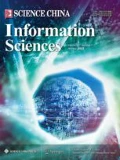Abstract
Since the concept of zero-knowledge protocols was introduced, it has attracted a lot of attention and in turn showed significant effect on the development of cryptography, complexity theory and other areas. The round complexity of a zero-knowledge protocol is a very important efficiency consideration, and it is required to be as small as possible. Generally, it is desirable to have zero-knowledge protocols with constant numbers of rounds. Goldreich and Oren proved that only languages in BPP have one-round and two-round zero-knowledge protocols. Moreover, they also showed that only languages in BPP have one-round honest-verifier zero-knowledge protocols. The notion of honest-verifier zero-knowledge protocols is highly non-trivial and fascinating itself, and has many other uses. Thus, the problem as to whether there exist two-round honest-verifier zero-knowledge protocols becomes an important open problem. In this paper, we introduce a new simulation technique and present a two-round honest-verifier zero-knowledge protocol for any language in NP under a standard complexity assumption based on this technique.
Similar content being viewed by others
References
Goldwasser S, Micali S, Rackoff C. The knowledge complexity of interactive proof systems. J Comput, 1989, 18: 186–208
Brassard G, Chaum D, Crepau C. Minimum disclosure proofs of knowledge. JCSS, 1988, 37: 156–189
Babai L. Trading group yheory for randomness. In: Proceedings of the 17th ACM Symposium on Theory of Computing, New York, 1985. 421–429
Ben-Or M, Goldreich O, Goldwasser S, et al. Everything provable is provable in zero-knowledge. In: Proceedings of Crypto88. Berlin: Springer, 1990.. 37–56
Goldreich O. Foundations of Cryptography: Basic Tools. Cambridge: Cambridge University Press, 2001
Goldreich O, Micali S, Wigderson A. Proofs that yield nothing but their validity or all languages in NP have zero-knowledge proofs. J ACM, 1991, 38: 691–729
Goldreich O, Oren Y. Definitions and properties of zero-knowledge proof systems. J Crypto, 1994, 7: 1–32
Brassard G, Crepeau C, Yung M. Constant-round perfect zero-knowledge computationally convincing protocols. Theor Comput Sci, 1991, 84: 23–52
Feige U, Shamir A. Zero-knowledge proofs of knowledge in two rounds. In: Advances in Cryptology-CRYPTO’89, LNCS 435. Berlin: Springer, 1989. 526–544
Goldreich O, Kahan A. How to construct constant-round zero-knowledge proof systems for NP. J Crypt, 1996, 9: 167–190
Barak B. How to go beyond the black-box simulation barrier. In: Proceedings of the 42nd Annual IEEE Symposium on Foundations of Computer Science, Las Vegas, Nevada, 2001. 106–115
Feige U, Lapidot A, Shamir A. Multiple non-interactive zero-knowledge proofs based on a single random string. J Comput, 1999, 29: 1–28
Goldreich O, Krawczyk H. On the composition of zero-knowledge proof systems, SIAM. J Comput, 1996, 25: 169–192
Barak B, Pass R. On the possibility of one-message weak zero-knowledge. In: Proceedings of the First Theory of Cryptography Conference, TCC 2004, Lecture Notes in Computer Science 2951. Berlin: Springer, 2004. 121–132
Dwork C, Stockmeyer L. 2-round zero-knowledge and proof auditors. In: Proceedings of the 34th ACM Symposium on the Theory of Computing, Montreal, Quebec, Canada, 2002. 332–331
Feige U, Shamir A. Witness indistinguishability and witness hiding protocols. In: Proceedings of the 22nd ACM Symposium on the Theory of Computing, Baltimore, Maryland, USA, 1990. 416–426
Dwork C, Naor M. Zaps and their applications. In: Proceedings of the 41st Annual IEEE Symposium on Foundations of Computer Science-FOCS’00. Redondo Beach, Canada, 2000. 283–293
Naor M. Bit commitment using pseudo-randomness. J Crypt, 1991, 4: 151–158
Blum M. How to prove a theorem so no one else can claim it. In: Proceedings of the International Congress of Mathematicians, Berkeley, California, 1986. 1444–1451
Author information
Authors and Affiliations
Corresponding author
Rights and permissions
About this article
Cite this article
Liu, H., Lin, D. A two-round honest-verifier zero-knowledge protocol. Sci. China Inf. Sci. 53, 954–963 (2010). https://doi.org/10.1007/s11432-010-0082-0
Received:
Accepted:
Published:
Issue Date:
DOI: https://doi.org/10.1007/s11432-010-0082-0




